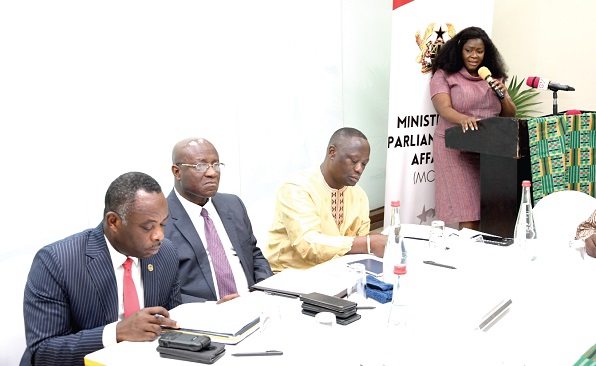The National Commission for Civic Education (NCCE) has called for the deepening of the multi- stakeholder approach to the constitutional review process in order to achieve the desired outcomes.
The Chairperson of the NCCE, Ms Kathleen Addy, who made the call, expressed the hope that the Majority and Minority Caucuses in Parliament and other leaders of society would continue to be part of the constitutional review process to see to its successful completion.
Ms Addy was speaking at a constitutional review technical consultation meeting in Accra yesterday, organised by the Ministry of Parliamentary Affairs in collaboration with the NCCE, the African Centre for Economic Transformation (ACET), the Institute of Economic Affairs (IEA), Centre for Democratic Development (CDD)-Ghana and Institute of Democratic and Economic Governance (IDEG).
Participants in the meeting included members of the Minority and the Majority sides of Parliament, the academia, civil society, the media and other key stakeholders; they are to come up with a road map for the constitutional review, a plan for the review of the constitution and how the plan could be rolled out.
Adopted in 1992, the country’s constitution has undergone several amendments, but no major constitutional reforms have been introduced in the past 31 years.
Bipartisan approach
Ms Addy said the role of the commission was critical in the constitutional review as it was the vanguard of the constitution.
"The NCCE is interested in the constitutional review because the people of Ghana are interested in the review of the constitution as demonstrated in surveys. We are interested because our job is to ensure that the people accept the constitution, live by it and defend it at all times because we want to remain a republic and we want our democracy to be sustained," she said.
"In the last constitutional review process, the NCCE was part. We collected the opinions of all Ghanaians through lectures, fora and meetings so everything that can possibly be changed in the constitution has been laid out. What we are embarking on should not be tedious. It should not be too long. It should be straightforward, crisp and lead to a point where we have a clear road map to reach our goal," she stated.
Open discussions
In his opening remarks, the Chief Director of the Ministry of Parliamentary Affairs, Dr Evans Aggrey-Darkoh, said the meeting was to provide a platform for frank, open, candid and reflective discussions among the participants.
He said it also formed part of efforts to build consensus, harness ideas and draw on the strength of the various stakeholders.
"As a ministry, we have worked assiduously to build consensus, promote inclusivity and the needed buy-ins and enhanced the quality of the proposals that will come in," he said.
Dr Aggrey-Darkoh said concerns over inconsistencies, irreconcilable provisions and gray areas in the constitution had made the review of the 31-year-old constitution imperative.
"Views expressed at various engagements attest to the collective interest to see a change in the actor behaviour of people to reinvigorate the culture of our constitution or reconfiguration of the institutional architecture of the constitution to make it much more functional or both," he said.
He said the ministry was mindful of the constitutional review exercise, which started in 2010 and culminated in the release of a report in December 2011, and that "the constitutional review report provided a useful reference point for any review exercise".
Background
In a quest to move from a political constitution to a developmental constitution, a Presidential Commission of Inquiry, Constitution Review Commission, was set up in January 2010 to consult with the people of Ghana on the operation of the 1992 Constitution and on any changes that needed to be made to the constitution.
The review of the constitution became necessary against the backdrop of perceived challenges of some provisions of the constitution that were believed to be obstructive to the maturation of Ghana's democracy.
The commission, among others, was also tasked to present a draft bill for the amendment of the constitution in the event that any changes are warranted.
In 2012, the commission presented its 984 paged final report summarising all the submissions it received from Ghanaians on the review of the 1992 Constitution, stating the findings and observations of the commission on the submissions; it also put forward recommendations.
However, a national referendum scheduled for December 2019 was called off, and the constitutional amendment bills were withdrawn from Parliament due to a lack of bipartisan consensus and broad-based public support for the amendment.
That notwithstanding, the demand for amendments has increased over the years with eminent Ghanaians, civil society organisations, political parties, youth and other groups continuously calling for changes to the 1992 Constitution.

